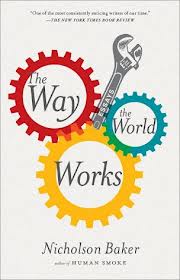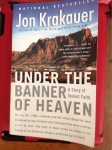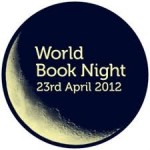#FridayReads, August 17–‘Somebody Owes Me Money,’ Donald E. Westlake & Essays by Nicholson Baker
 #FridayReads, August 17–Somebody Owes Me Money, Donald E. Westlake’s enjoyable 1969 mystery narrated by Chet Conway, a wise-cracking cab driver. One day Chet gets an unusual tip from a fare–rather than a couple extra bucks for the ride, his customer offers a tip on a horse race: bet on Purple Pecunia to win. Chet does place a wager with his bookmaker, and the pony comes in, but when he goes to collect his winnings, the bookie’s been murdered. Chet wonders, who am I supposed collect from? Much delightful hilarity and chaos ensues, including a budding romance with Abbie, the daughter of the murdered man, and many clashes with rival gangs with an interest in the dead bookie’s clientele. A great reprint of a classic mystery, from the fun imprint Hard Case Crime.
#FridayReads, August 17–Somebody Owes Me Money, Donald E. Westlake’s enjoyable 1969 mystery narrated by Chet Conway, a wise-cracking cab driver. One day Chet gets an unusual tip from a fare–rather than a couple extra bucks for the ride, his customer offers a tip on a horse race: bet on Purple Pecunia to win. Chet does place a wager with his bookmaker, and the pony comes in, but when he goes to collect his winnings, the bookie’s been murdered. Chet wonders, who am I supposed collect from? Much delightful hilarity and chaos ensues, including a budding romance with Abbie, the daughter of the murdered man, and many clashes with rival gangs with an interest in the dead bookie’s clientele. A great reprint of a classic mystery, from the fun imprint Hard Case Crime.
Also reading Nicholson Baker’s new essay collection, The Way the World Works. He’s been one of my favorite writers ever since I read his first novel, The Mezzanine, in 1988. I met Baker when he won the 2001 National Book Critics Circle nonfiction award for for his book, Double Fold: Libraries and the Assault on Paper and we’ve emailed each other periodically since. His attention-grabbing funny and frankly sexual novels, such as House of Holes, are what he’s best known for nowadays, but I really relish his essays, such as the 1997 collection, The Size of Thoughts: Essays and Other Lumber. Not to be overlooked is Human Smoke: The Beginnings of World War II, the End of Civilization, a remarkable book of aggregated content not Baker’s own that approximates a pacifist history of the decades between World War I and World War II. In the new collection Baker–always a writer fascinated with the physicality of things and the visceral and corporeal in everyday life–examines airplane wings, coins, earplugs, and ereading devices.










